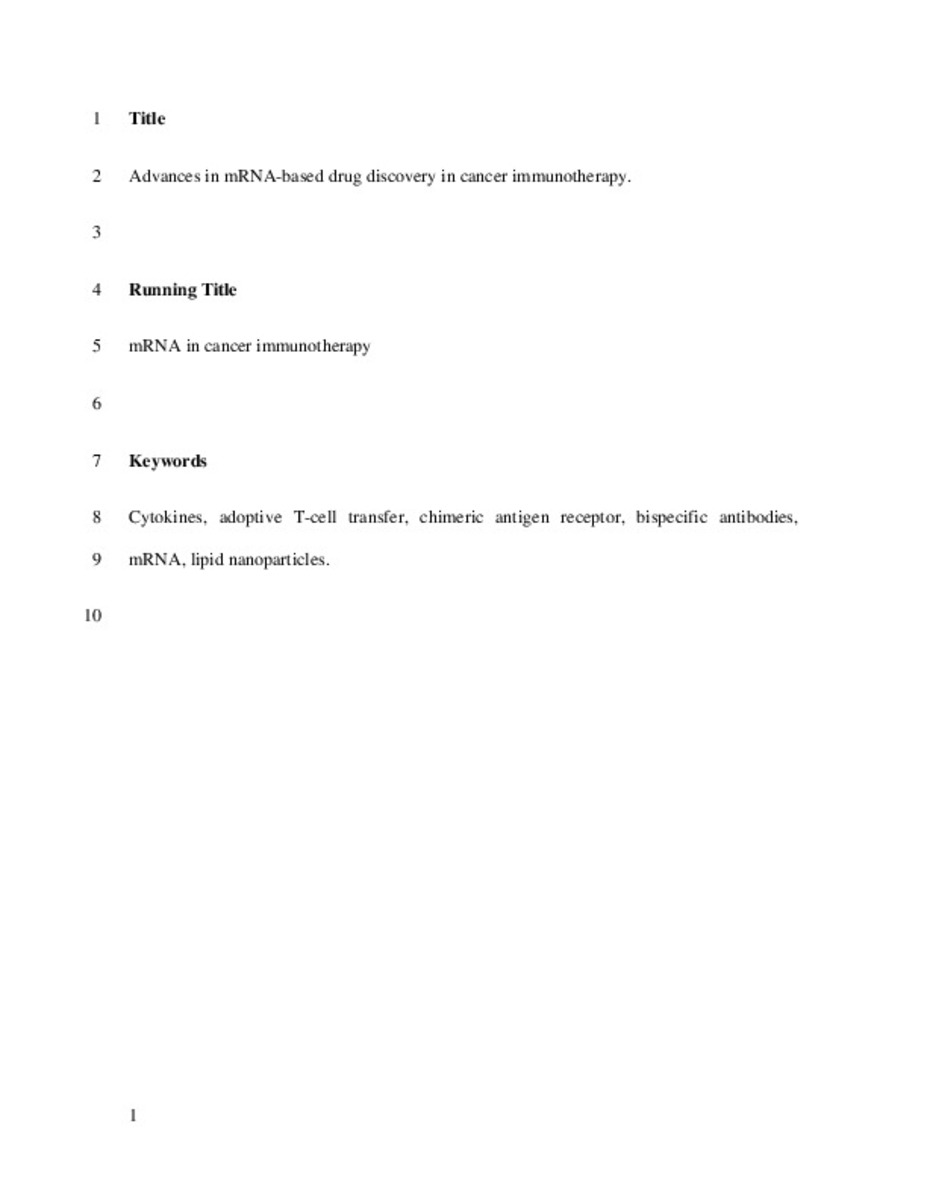Full metadata record
| DC Field | Value | Language |
|---|---|---|
| dc.creator | Di-Trani, C.A. (Claudia Augusta) | - |
| dc.creator | Fernández-Sendín, M. (Myriam) | - |
| dc.creator | Cirella, A. (Assunta) | - |
| dc.creator | Segués, A. (Aina) | - |
| dc.creator | Olivera, I. (Irene) | - |
| dc.creator | Bolaños, E. (Elixabet) | - |
| dc.creator | Melero, I. (Ignacio) | - |
| dc.creator | Berraondo, P. (Pedro) | - |
| dc.date.accessioned | 2022-04-06T07:16:30Z | - |
| dc.date.available | 2022-04-06T07:16:30Z | - |
| dc.date.issued | 2022 | - |
| dc.identifier.citation | Di-Trani, C.A. (Carla Augusta); Fernández-Sendín, M. (Myriam); Cirella, A. (Assunta); et al. "Advances in mRNA-based drug discovery in cancer immunotherapy". Expert opinion on drug discovery. 17 (1), 2022, 41 - 53 | es |
| dc.identifier.issn | 1746-0441 | - |
| dc.identifier.other | 34496689 | - |
| dc.identifier.uri | https://hdl.handle.net/10171/63352 | - |
| dc.description.abstract | Introduction: Immune checkpoint inhibitors and adoptive T-cell therapy based on chimeric antigen receptors are the spearhead strategies to exploit the immune system to fight cancer. To take advantage of the full potential of the immune system, cancer immunotherapy must incorporate new biotechnologies such as mRNA technology that may synergize with already approved immunotherapies and act more effectively on immune targets. Areas covered: This review describes the basics of mRNA biotechnology and provides insight into the recent advances in the use of mRNA for the local and systemic delivery of immunostimulatory antibodies, proinflammatory cytokines or for optimizing adoptive T-cell therapy. Expert opinion: mRNA-based nanomedicines have great potential to expand the arsenal of immunotherapy tools due to their ability to simplify and accelerate drug development and their suitability for transient and local expression of immunostimulatory molecules, whose systemic and sustained expression would be toxic. The success of mRNA-based COVID-19 vaccines has highlighted the feasibility of this approach. Continuous advances in the delivery and construction of RNA-based vectors hold promise for improvements in clinical efficacy. | es_ES |
| dc.description.sponsorship | This study was supported by Instituto de Salud Carlos III (PI19/01128) cofinanced by Fondos FEDER, Gobierno de Navarra Proyecto LINTERNA Ref.: 0011-1411-2020-000075, the Spanish Ministry of Economy and Competitiveness (MINECO SAF2014-52361-R and SAF 2017-83267-C2-1R [AEI/FEDER,UE]), the Cancer Research Institute under the CRI-CLIP, the Asociación Española Contra el Cancer (AECC) Foundation under Grant GCB15152947MELE. This project has also received funding from the European Union’s Horizon 2020 research and innovation programme under the Marie Skłodowska-Curie grant agreement No 765394. Furthermore, M Fernandez-Sendin is the recipient of a fellowship from the Aid Program Assigned to Projects from the University of Navarra. | es_ES |
| dc.language.iso | eng | es_ES |
| dc.publisher | Taylor & Francis | es_ES |
| dc.relation | info:eu-repo/grantAgreement/EC/H2020/765394/EU | es_ES |
| dc.rights | info:eu-repo/semantics/openAccess | * |
| dc.subject | Cytokines | es_ES |
| dc.subject | Adoptive T-cell transfer | es_ES |
| dc.subject | Chimeric antigen receptor | es_ES |
| dc.subject | Bispecific antibodies | es_ES |
| dc.subject | 9 mRNA | es_ES |
| dc.subject | Lipid nanoparticles | es_ES |
| dc.title | Advances in mRNA-based drug discovery in cancer immunotherapy | es_ES |
| dc.title.alternative | mRNA in cancer immunotherapy | es_ES |
| dc.type | info:eu-repo/semantics/article | es_ES |
| dc.identifier.doi | 10.1080/17460441.2021.1978972 | - |
| dadun.citation.endingPage | 53 | es_ES |
| dadun.citation.number | 1 | es_ES |
| dadun.citation.publicationName | Expert opinion on drug discovery | es_ES |
| dadun.citation.startingPage | 41 | es_ES |
| dadun.citation.volume | 17 | es_ES |
Files in This Item:
Statistics and impact
Items in Dadun are protected by copyright, with all rights reserved, unless otherwise indicated.






